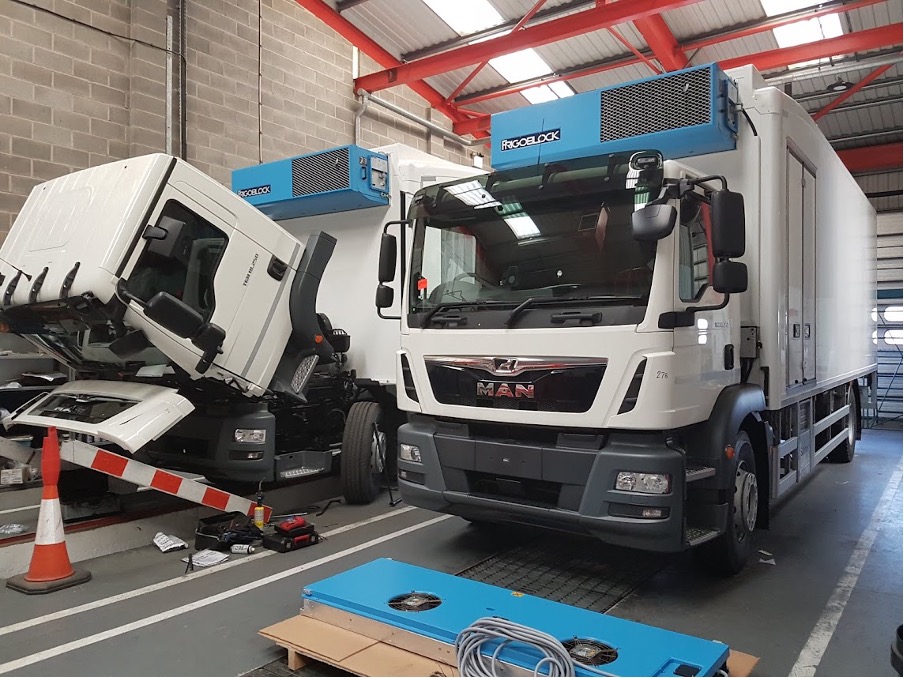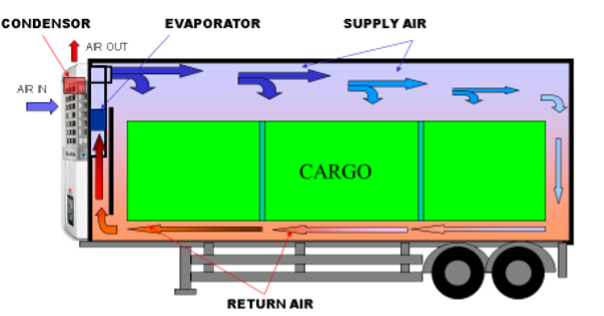It’s commonplace for firms to lament a shortage of suitably trained staff, and it’s no different in our sector – transport refrigeration systems.
Here at Michael Ward Limited (MWL) we are direct importers, sales and service agents for FRIGOBLOCK, a brand of Thermo King, focused on electrically powered systems, who are at the vanguard of the shift from traditional diesel-powered refrigeration units to a more sustainable and environmentally friendly electric alternative.
Electrification is seen as one of the best solutions to reduce road freight carbon emissions from the trucks on our roads, with most manufacturers moving in that direction.
We are proud and delighted to be at the leading edge of this shift – but we need transport refrigeration engineers to join us on the journey to a greener, more sustainable future.
MWL MD Graham Galloway says: “To my mind, a company is only as good as the people it employs and the service it provides. Since we became direct importers, sales and service agents for FRIGOBLOCK, we are constantly searching for more engineers.
“Transport refrigeration engineers are in high demand and good, experienced engineers can earn £40-60k with overtime.
“However, it is not a career that is highly visible, and many potential high-quality candidates are simply unaware of the opportunities that exist. Many of our successful trainees have been recommended to us by our existing engineers and they have diverse backgrounds. The qualities they have in common are a background in a related discipline and the hunger to learn and develop their skills. Transport refrigeration is an excellent platform for them and there are many opportunities.”
Read on to discover more about FRIGOBLOCK, transport refrigeration, the refrigeration principle and what the job of a mobile transport refrigeration engineer involves.

FRIGOBLOCK is part of the worldwide Thermo King portfolio. It manufactures engineless transport refrigeration systems for heavy trucks and trailers.
The system works by generating electrical power from the vehicle engine by connecting an alternator via a belt. It avoids using a separate diesel engine and the associated harmful CO2 and noxious fumes resulting from burning additional fossil fuels.
They are very efficient systems and can also be powered by rechargeable battery packs, including the battery pack of a fully electric van, truck or larger HGV.
Perishable goods such as food, pharmaceuticals, flowers and medical products transported in vans, lorries and trailers, are required to be kept at a certain temperature to prevent them from deteriorating and losing value.
The equipment installed to these vehicles to control the temperature are called transport refrigeration systems. Their function is to remove unwanted heat from the storage area to maintain a set temperature. For some frozen products this could be as low as -25-30 degrees centigrade.

In a standard refrigeration system, the aim is to remove heat from the air in the space surrounding the stored product and then release the heat into the area outside of the storage space.
This is achieved by causing a liquid refrigerant to change state from a liquid to a gas within the storage space, and thereby absorbing heat from the air in the space during this process.
The absorbed heat is then carried within the gas to the outside of the storage space, where it is condensed back to a liquid and in the process gives up its heat to the atmosphere. This cycle is repeated continuously to achieve the desired temperature within the storage space.
In order to keep machinery working as efficiently as possible regular maintenance is very important and transport refrigerant systems are no exception.
The cargo carried in refrigerated vehicles is often very high value and it is very important to ensure the equipment is working correctly and efficiently to protect the cargo board.
A transport refrigeration engineer will install and commission systems on vehicles and trailers, provide regular servicing and respond to breakdowns. It’s a crucial role in ensuring the country’s supply chain keeps moving.
“The team at MWL is the best in the business, in my opinion. We are extremely proud of them, but we are always on the lookout for the right candidates . A recruitment advertisement is a constant presence in the careers section of our website,” explains MD Graham.
The use of refrigerated vehicles is growing as witnessed by the huge growth in home delivery by the major supermarkets and the delivery of COVID-19 vaccines during the pandemic.
It is also going through a period of rapid changes in technology as the world moves towards net zero and strives to reduce harmful CO2 emissions. The transport refrigeration system of the past few years that may have been powered by a diesel engine is likely to be powered in the future by a battery pack that has the capability of being recharged from the electricity grid, solar panels or regenerated power from the vehicle’s axles.
Transport Refrigeration Engineers are highly skilled individuals who combine a range of refrigeration and automotive skills to repair and maintain transport refrigeration systems, often on our customers’ sites.
Graham adds: “There has never been a better time for someone with good basic mechanical skills, and an inquisitive, enquiring mind to enter our industry.
“The ability to work on different types of equipment safely using the correct tools, often on a customer’s premises under time pressure are characteristics we are always on the lookout for, especially those with experience within a related discipline in other industries such as commercial refrigeration, auto electrician or commercial vehicle repairer. It’s this experience that provides a foundation to be successful as a transport refrigeration engineer.”
These are the essential qualities we look for in a fully trained mobile transport refrigeration engineer:
We think it is an exciting career opportunity for anyone who shows the correct attitude and aptitude based on those qualities to join the MWL team as a trainee.
In the first year this involves basic refrigeration training with our training partner and on-the-job training in our busy workshop.
Our trainees then progress to more advanced training including the F Gas City & Guilds 2079 qualification, which will allow you to work with highly regulated refrigerants.
After passing the F Gas qualification, you will then progress to FRIGOBLOCK factory approved courses to learn how to work on more complex equipment. By this stage our trainees will be accompanying experienced mobile engineers to help with service and breakdowns on customer sites.
The next stage would then be to aim to work independently on equipment with limited assistance, but with the safety net of a technical support team and asked to form part of our 24/7 call out rota.
Would-be trainees should email their CV with a covering letter to: service@michaelward.co.uk, or for our existing senior vacancies visit our website’s careers section here.